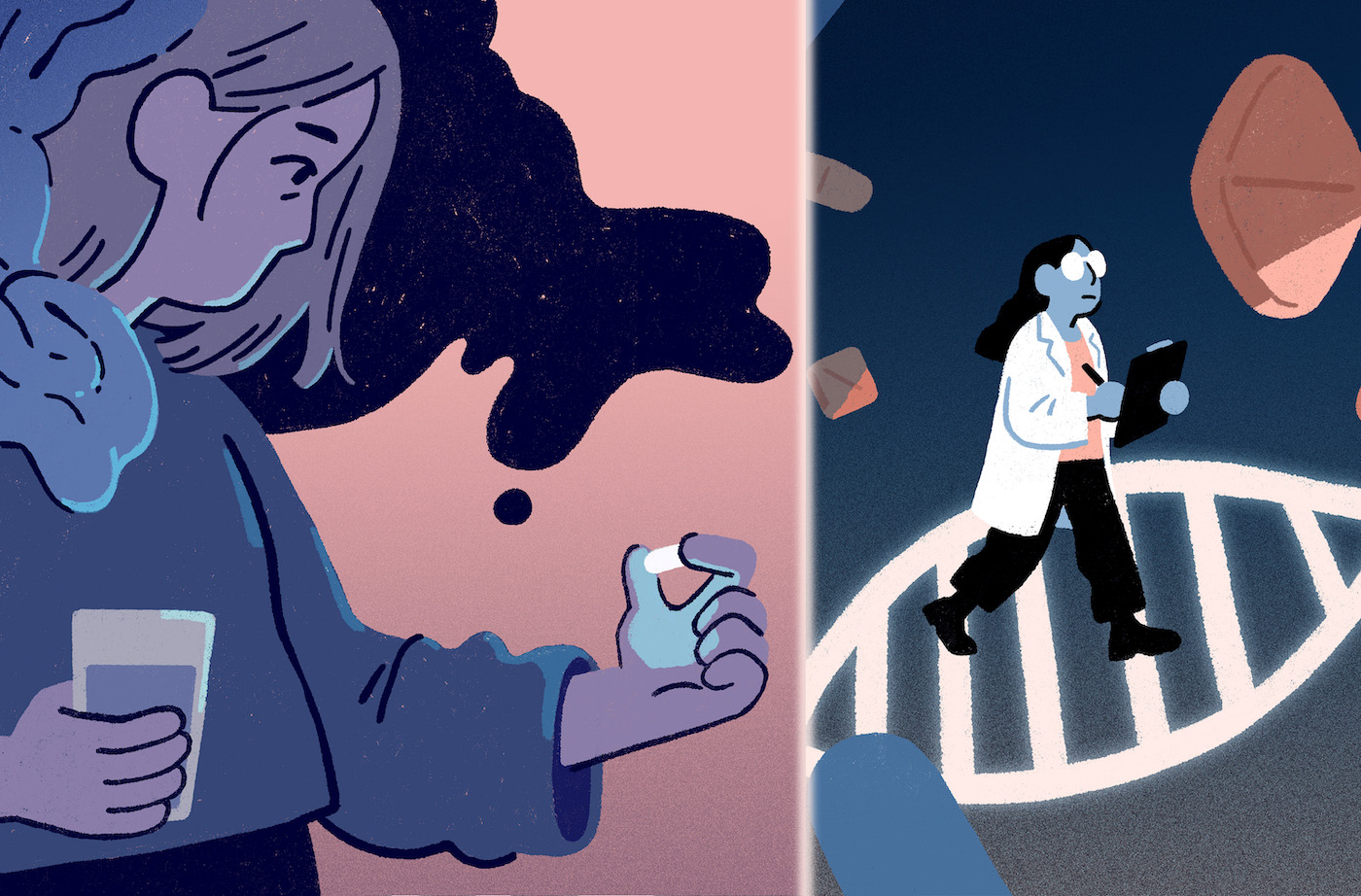Advances In Understanding Depression Offer Potential New Treatments
While more than one in ten Americans take antidepressants, some scientists think popular depression treatments don’t fully address the leading causes of depression.

Illustrations by Jean Wei
When drugs like Prozac were first introduced in the late 1980s, the leading theory behind their market success was that depressed people lacked serotonin, a key brain chemical. Called the “chemical imbalance theory,” the idea was that you could give patients an SSRI, or a Serotonin Reuptake Inhibitor (like Prozac or Zoloft), and their serotonin would increase, lifting their depression.
The trouble is, when researchers started testing this theory, they found it didn’t hold up. Serotonin is involved in depression—and for many depression patients, SSRIs are incredibly helpful—but how the medicine works is more complicated than it originally seemed. Yet public understanding of how antidepressants work has not kept up with the science.
In September 2022, Ira spoke to Dr. David Hellerstein, professor of clinical psychiatry at Columbia University and Dr. David Oslin, professor of psychiatry at the University of Pennsylvania Perelman School of Medicine. Hellerstein and Oslin explained what we do and don’t know about how antidepressants affect the brain, and the latest pharmaceutical treatment options for depression.
“The treatments that we use, to the degree that they’re effective, have an impact on… brain health. But it takes a while for that to happen,” said Hellerstein.
While SSRIs work for many patients, scientists now know that lack of serotonin isn’t the only factor influencing clinical depression. Hellerstein points out that antidepressants increase serotonin in the brain very quickly, but it can take up to several weeks before a patient’s mood improves. If depression is singularly caused by a lack of serotonin, why don’t SSRIs cure patients right away?
“Something happens in the brain that is a delayed process, and clearly is much more complicated than just ‘filling the tank’ [with serotonin],” said Hellerstein. Researchers have moved away from this serotonin deficiency model to explain the causes of depression. A chronic stress model has taken its place as another explanation of the underlying causes of depression.
“Some people have more risk for depression, anxiety, or PTSD, [because] chronic stress causes changes in the brain that are very difficult to undo except with some kind of treatment,” said Hellerstein.
Chronic stress and pain are known to decrease healthy brain characteristics, said Hellerstein. The number of connections between brain cells and even the size of the brain decrease when exposed to consistent stress and anxiety.
“The brain is basically injured in the state of depression or anxiety disorders,” he said.
Research suggests that depression is caused by a combination of biological and environmental factors, and medications that chemically treat depression are not the only evidence-based treatment options available. Other kinds of therapy, including cognitive behavioral therapy, have also been shown to help patients.
But it can be difficult to find the right medicine for each patient. Because each drug has various effects on an individual patient and their unique suite of symptoms, physicians sometimes have to use a trial and error approach to prescription.
Recent advances towards precision mental healthcare could offer new ways to help patients find the right treatment faster.
Dr. David Oslin, professor of psychiatry at the University of Pennsylvania, recently conducted research through the Veterans Administration to see if genetic testing might help doctors select the right medications for patients. He and his colleagues specifically looked for genes that affect metabolism.
“If I have a genetic test that suggests that a medicine is poorly metabolized or rapidly metabolized,” Oslin said, “swapping it out or just taking it away could actually lead to a better outcome for that patient.”
He’s hopeful that the field is moving towards personalized mental health care.
“I think a lot of people think of mental health as this black box of only sitting down and lying on the couch and talking things out. But we really do have a lot of different evidence-based approaches to treating different illnesses,” said Oslin.
Besides being able to prescribe medications, physicians are increasingly looking to alternative treatments. Psilocybin mushrooms and ketamine, for example, cause immediate changes in brain activity that look promising to mental health researchers. A significant number of patients with treatment-resistant depression who take psilocybin mushrooms in clinical settings experience improvements in their condition for weeks, according to Dr. Hellerstein’s research.
These kinds of rapid-acting treatments, Hellerstein explained, can help reconnect the brain in new ways. “There’s evidence that these drugs increase plasticity, or the ability of the adult brain to reconnect and regrow connections,” he said.
This new treatment option offers an opportunity to get out of stressful mental routines, which can be essential for some patients.
“One of the things that seems to happen for a lot of people with depression is kind of a broken record [effect]. You get a groove worn into a record, which plays the same couple of notes over and over again,” said Hellerstein. “[Newer compounds like psilocybin] can get people out of those broken-record cycles.”
Hellerstein and Oslin are excited to have progressed beyond the serotonin deficiency model of depression, and to have potentially more informed and more effective options to offer patients. Serotonin is clearly not the end of the story, Hellerstein said.
“We see a complicated system, but one that may have possible places to make an impact that could be rapid in onset—and could have a significant impact,” said Hellerstein.
Want to hear more? Click here to listen to the full SciFri radio interviews this article was based on with Dr. David Hellerstein and Dr. David Oslin.
The following resources are available if you or someone close to you is in need of mental health support:
Invest in quality science journalism by making a donation to Science Friday.
Emma Lee Gometz is Science Friday’s Digital Producer of Engagement. She writes SciFri’s “Science Goes To The Movies” series and is a journalist and illustrator based in Queens, NY.